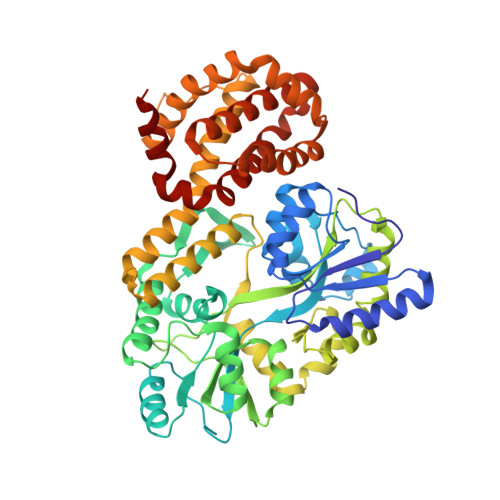Development of Potent Mcl-1 Inhibitors: Structural Investigations on Macrocycles Originating from a DNA-Encoded Chemical Library Screen.
Hekking, K.F.W., Maroto, S., van Kekem, K., Haasjes, F.S., Slootweg, J.C., Oude Alink, P.G.B., Dirks, R., Sardana, M., Bolster, M.G., Kuijpers, B., Smith, D., Doodeman, R., Scheepstra, M., Zech, B., Mulvihill, M., Renzetti, L.M., Babiss, L., Centrella, P.A., Clark, M.A., Cuozzo, J.W., Guie, M.A., Sigel, E., Habeshian, S., Hupp, C.D., Liu, J., Thomson, H.A., Zhang, Y., Keefe, A.D., Muller, G., Gremmen, S.(2024) J Med Chem 67: 3039-3065
- PubMed: 38306405
- DOI: https://doi.org/10.1021/acs.jmedchem.3c02206
- Primary Citation of Related Structures:
8QSO - PubMed Abstract:
Evasion of apoptosis is critical for the development and growth of tumors. The pro-survival protein myeloid cell leukemia 1 (Mcl-1) is an antiapoptotic member of the Bcl-2 family, associated with tumor aggressiveness, poor survival, and drug resistance. Development of Mcl-1 inhibitors implies blocking of protein-protein interactions, generally requiring a lengthy optimization process of large, complex molecules. Herein, we describe the use of DNA-encoded chemical library synthesis and screening to directly generate complex, yet conformationally privileged macrocyclic hits that serve as Mcl-1 inhibitors. By applying a conceptual combination of conformational analysis and structure-based design in combination with a robust synthetic platform allowing rapid analoging, we optimized in vitro potency of a lead series into the low nanomolar regime. Additionally, we demonstrate fine-tuning of the physicochemical properties of the macrocyclic compounds, resulting in the identification of lead candidates 57 / 59 with a balanced profile, which are suitable for future development toward therapeutic use.
Organizational Affiliation:
Symeres, 6546BB Nijmegen, The Netherlands.
















